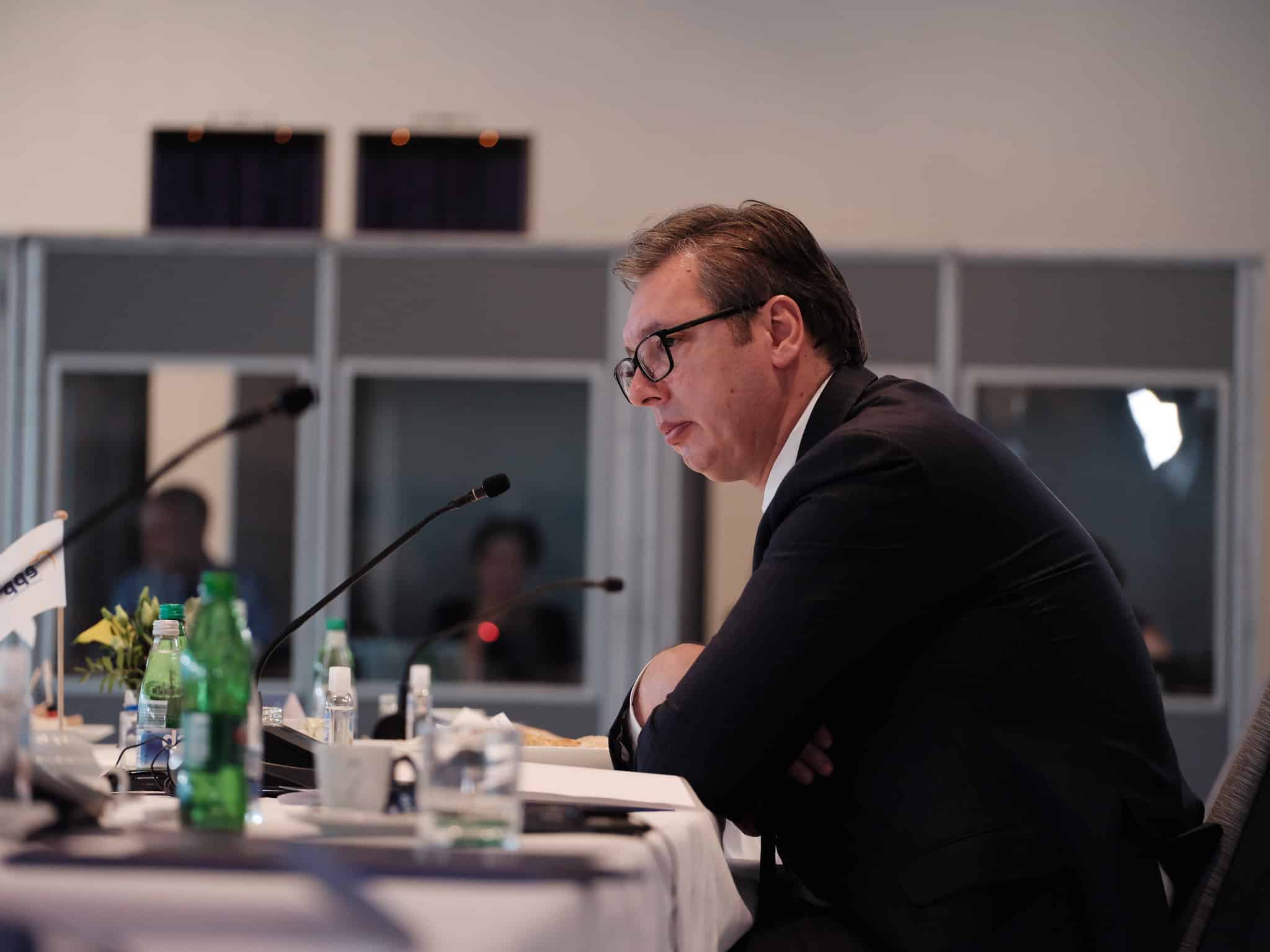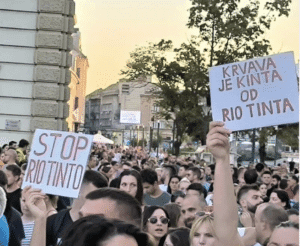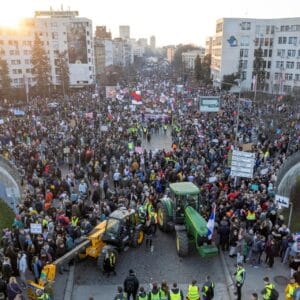Serbian President Aleksandar Vučić in 2019 (source: Flickr)
Last Sunday, April 3, general elections were held in Serbia. The general elections were deemed crucial amid geopolitical turbulence and the re-organization of the political opposition, that boycotted parliamentary elections earlier in 2020. As expected, incumbent President Aleksandar Vučić won a second term, giving him another five years in office. His Serbian Progressive Party (SNS) also did well – it won a majority of parliament with its loyal ally the Socialist Party of Serbia (SPS). With 97% of votes counted, a turnout of 58.71% is reported.
Presidential elections
In Serbia’s presidential elections, Vučić faced a candidate from the united opposition (United for the Victory of Serbia, US): Zdravko Ponoš. With Ponoš, they hoped to find a pragmatic candidate that could challenge Vučić, especially after the December 2021 mass protests against lithium mining in the country. With fielding Ponoš, US hoped to force a second round of presidential elections, but this proved to be too optimistic. Ponoš, a retired army general, won 18.8% of the votes. Vučić took 60.0% of the votes, thus winning with a wide margin. The result is a major disappointment for the united opposition, which did not run in elections in 2020 citing government influence over the media made free voting impossible. It is only slightly more than the 16.35% Saša Janković took in 2017 as Vučić’s major opponent. See the complete results, with 97.5% counted, below.
Candidate | Party | Votes, % | % |
Aleksandar Vučić | Serbian Progressive Party | 2,178,422 | 60.01 |
Zdravko Ponoš | United for the Victory of Serbia | 682,365 | 18.80 |
Miloš Jovanović | National Democratic Alternative | 221,636 | 6.11 |
Boško Obradović | Dveri–POKS | 162,445 | 4.48 |
Milica Đurđević Stamenkovski | Serbian Party Oathkeepers | 157,823 | 4.35 |
Biljana Stojković | We Must | 119,313 | 3.29 |
Branka Stamenković | Sovereignists | 75,590 | 2.08 |
Miša Vacić | Serbian Right | 32,306 | 0.89 |
Parliamentary elections
In parliamentary elections, Vučić’s SNS party won 43.5% of the votes. His “Together We Can Do Everything” coalition took a total of 44.3%. It is expected to form a coalition with its loyal ally, the SPS, who took 11.6% of the votes. The united opposition US took 14.0% at the parliamentary polls, thus also losing to Vučić with a wide margin. The Green ‘We Must’ coalition took 4.8% of the votes.
Notable is the win of conservative, far-right parties, such as the ‘Serbian Party Oathkeepers’. This anti-EU, Russophile party took 3.8% – demonstrating the existing pro-Russian sentiment in the country. It seems that the positioning of Vučić towards the war in Ukraine cost SNS the support of pro-Russian nationalists who went to more minor, far-right and clerical parties. In this regard, Vučić is in an awkward position. He chose to vote in favour of UN resolutions against Russia, but did not join EU sanctions. Unfortunately, these results would point more to a pro-Russian course, as far-right nationalists won seats, next to SNS doing well. See the complete results, with 97.5% counted, below. Only the parties that won seats are included.
Party/coalition | Votes | % | Seats |
“Together We Can Do Everything” SNS-led coalition | 1,593,344 | 44.31 | 120 |
“United for the Victory of Serbia” | 503,721 | 14.01 | 37 |
Socialist Party of Serbia with the smaller United Serbia (JS) and Greens of Serbia (ZS) | 425,060 | 11.82 | 32 |
National Democratic Alternative | 199,124 | 5.54 | 15 |
We Must | 172,352 | 4.79 | 13 |
Dveri–POKS | 141,738 | 3.94 | 10 |
Serbian Party Oathkeepers | 138,260 | 3.84 | 10 |
Alliance of Vojvodina Hungarians (minority party) | 59,080 | 1.64 | 6 |
Justice and Reconciliation Party (minority party) | 34,434 | 0.96 | 3 |
DSHV–ZZV (minority party) | 23,661 | 0.66 | 2 |
Party of Democratic Action of Sandžak (minority party) | 20,258 | 0.56 | 2 |
Social democratic parties
Pro-EU forces have lost in these elections. US and ‘We Must’ together took 50 seats. They fall below the threshold of being able to submit initiatives in parliament independently. Boris Tadić’s coalition fell below the 3% threshold. Pro-EU, social democratic parties wish for Serbia to join the EU as soon as possible. The path towards admission now wholly depends on the SNS. This remains to be a difficult course, as the SNS has good ties to Russia and China, and wishes to accommodate the far-right, anti-Western base in the country.
Elections in the city of Belgrade
In the local elections in the city of Belgrade, elections were tighter. SNS is projected to win 48 of 110 seats, while the largest opposition group – United for Belgrade Victory – takes 26 seats. Still, quite some votes have to be counted and it remains unclear who will eventually form the city government. It seems most probable that SNS will find a majority with the Socialist (Dacic) and Democratic Party of Serbia (Milos Jovanovic, former Kostunica party). Thus, while performing better than nationally, the opposition’s goal of conquering at least Belgrade was not achieved.
Irregularities and violence during voting
The elections were marked by many irregularities and violence at polling stations. Independent monitoring mission CRTA noted irregularities in 18% of polling stations. CRTA said that ballot stations in Belgrade and Novi Sad did not cooperate with electoral observers. Various observes reported intimidation and vote-buying taking place, and that the voting process was non-transparent.
SNS loyalists physically attacked the President of Movement of Free Citizens (PSG) Pavle Grbović outside the polling station where he voted. Serbian opposition is currently looking to go to court for this plethora of voting irregularities. For longer, non-governmental organizations and political opposition have accused Vučić and his SNS party of corruption, nepotism, violence towards political opposition and ties with organized crime.
Serbia’s challenges ahead
Vučić reacted proudly, saying he was “pleased that a huge number of people voted and showed the democratic nature of Serbian society”. In the meantime, the elections, marred with irregularities, turned Serbia even further on the path of autocracy. The road towards EU accession remains difficult as Vučić will continue his awkward geopolitical positioning to satisfy domestic and international pressures on his SNS party. For the country’s pro-EU, pro-democratic opposition, elections were a big blow. It remains close to impossible to challenge Vučić in the current, unfair political playing field in which the SNS controls major institutions. It is crucial that the EU maintains pressure on Serbia to respect democratic institutions and to properly investigate voting irregularities. Only then, the path towards EU admission remains probable.
Sources: Reuters Radio Free Europe I Radio Free Europe II Balkan Insight I BBC Balkan Insight II b92 Sydney Morning Herald
Photo: Flickr



